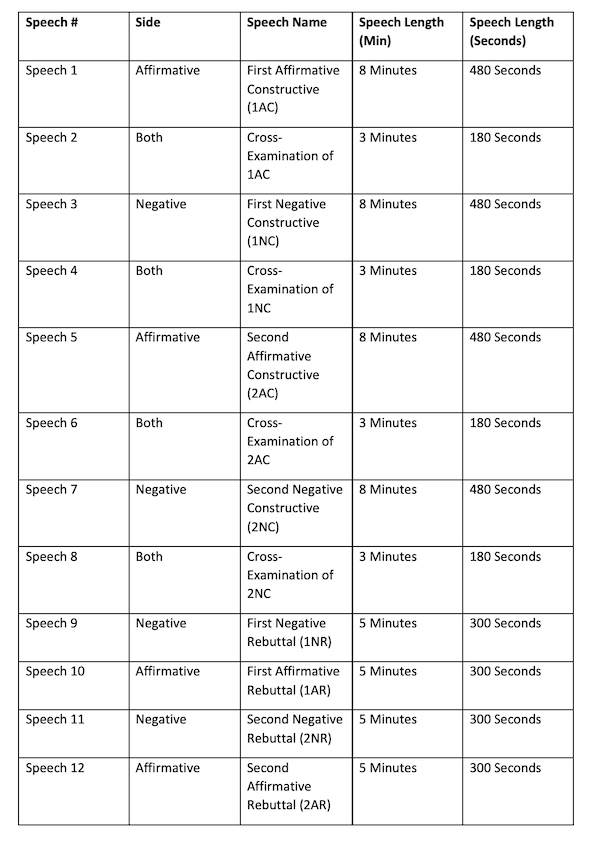What is the Best Way to Start a Debate
The best way to start a debate is by posing a thought-provoking question or making a bold statement that sparks interest and grabs the audience’s attention. By doing so, you can set the tone for a lively discussion and encourage participants to express their views and engage in a productive exchange of ideas.
A compelling opening can generate excitement and ensure that everyone is actively involved from the beginning. It is essential to choose a topic that is relevant and controversial, as this will keep the audience engaged and eager to participate. Remember, a strong start is the key to a successful debate where ideas are challenged, perspectives are widened, and knowledge is shared.
So, be bold, be intriguing, and kickstart the conversation with a captivating beginning.
/cloudfront-us-east-1.images.arcpublishing.com/pmn/CIJSUHMLIVHC5DGD72S3JPY6RU.jpg)
Credit: www.inquirer.com
Setting The Tone For A Productive Discussion
Setting the tone for a productive discussion begins by creating curiosity and capturing attention. One effective way to achieve this is by using an anecdote or personal story that connects with the audience. These relatable experiences can immediately draw people in and make them more receptive to the topic being discussed.
Another approach is to present a thought-provoking question that challenges conventional thinking and sparks curiosity. By encouraging individuals to consider different perspectives or challenging their beliefs, the stage is set for a stimulating debate. Through these techniques, the audience is compelled to actively engage in the discussion, fostering a more productive and lively exchange of ideas.
Ultimately, the best way to start a debate is by capturing the audience’s attention, drawing them in, and encouraging them to think critically about the topic at hand.
Presenting Compelling Arguments To Support Your Stance
Starting a debate requires presenting compelling arguments supported by thorough research, organizing key points logically and persuasively, and anticipating counterarguments with strong rebuttals. To establish a solid foundation for your debate, it is essential to conduct extensive research to gather supporting evidence.
This will enable you to present well-informed arguments. Next, organize your key points in a manner that leads the audience to understand and resonate with your stance. Additionally, prepare for counterarguments by anticipating opposing viewpoints and crafting strong rebuttals to counter them effectively.
By following these steps, you can confidently approach any debate, armed with a well-researched, well-organized, and persuasive argumentative framework.
Active Listening And Responding With Empathy
Starting a debate requires active listening and responding with empathy. It is important to acknowledge and address the opposing viewpoint, showing respect for different perspectives. Before responding, take the time to reflect on the speaker’s arguments, understanding their reasoning and logic.
Avoid personal attacks or derogatory language, as this can hinder productive discussions. Instead, focus on addressing the points made and providing counterarguments or alternative perspectives. By maintaining a respectful and open-minded approach, debates can become opportunities for growth and understanding.
Emphasizing active listening, empathy, and respectful dialogue fosters meaningful discussions that can lead to constructive outcomes.
Using Diplomatic Language And Tone
The best way to start a debate is by using diplomatic language and tone. This involves choosing words and phrases that promote constructive dialogue and avoiding strong emotional language. By employing neutral terms, you can create a more balanced and fair discussion.
Additionally, it is important to emphasize mutual respect and understanding throughout the debate. This means treating all participants with courtesy and acknowledging their perspectives. By approaching the debate with a diplomatic language and tone, you can foster a more productive and engaging discussion.
So, next time you want to start a debate, remember the power of choosing your words wisely and promoting a respectful and understanding atmosphere.
Welcoming And Encouraging Diverse Perspectives
To create an inclusive atmosphere for all participants in a debate, it is important to invite individuals with different viewpoints to contribute. Each person’s perspective brings value and enriches the overall discussion. By welcoming diverse opinions, we foster an environment that encourages open dialogue and learning.
This approach cultivates understanding and promotes the exploration of various ideas. It is through the sharing of these different viewpoints that we can challenge our own beliefs and gain new insights. Embracing diversity in debates allows for a more comprehensive understanding of complex topics and ultimately leads to more productive and meaningful conversations.
So, let us invite diverse voices and acknowledge the richness they bring to our debates.
Moderating The Discussion Fairly And Effectively
Starting a debate on the right foot involves fair moderation and effective communication. It is essential to ensure equal speaking time for all participants, promoting a respectful turn-taking dynamic and avoiding interruptions. By establishing guidelines for addressing conflicts, we can guide the conversation back on track when necessary.
Encouraging open-mindedness and empathy are key to maintaining a productive and stimulating debate environment. Moderating with neutrality and impartiality fosters an atmosphere where everyone feels heard and valued. By incorporating these strategies, we can create a platform for meaningful dialogue and constructive discussions.
The best way to start a debate lies in setting the tone for fairness and allowing participants to express their viewpoints freely.
Frequently Asked Questions For What Is The Best Way To Start A Debate
How Do You Start A Debate Opening Statement?
To start a debate opening statement, begin by introducing yourself and acknowledging the topic. State your perspective clearly and provide a strong, concise thesis statement. Present key arguments to support your position, ensuring they are logical, relevant, and impactful. Use persuasive language and evidence to make your points compelling.
Address any potential counterarguments and preemptively refute them. Engage with the audience by using rhetorical questions or relevant anecdotes. Maintain a confident and powerful tone throughout, but avoid being overly aggressive or disrespectful. Keep your opening statement concise and focused, highlighting the most important points.
By following these guidelines, you can effectively grab the audience’s attention and set the stage for a compelling debate.
What Are 3 Tips For Debate?
Here are 3 tips for debate: 1. Prepare thoroughly: Research the topic, gather evidence, and consider different perspectives to make a compelling argument. 2. Communicate clearly: Use concise language to express your points effectively and avoid confusion. Maintain a confident tone and articulate your thoughts confidently.
3. Listen attentively: Pay careful attention to your opponent’s arguments to identify weaknesses and counter them effectively. Respond respectfully and avoid interrupting to maintain a productive debate atmosphere. Remember, thorough preparation, clear communication, and active listening are key to succeeding in a debate.
By following these tips, you can present strong arguments, make persuasive points, and engage in a meaningful exchange of ideas.
How Do You Make A Good Debate?
A good debate can be made by following these key steps. First, thoroughly research the topic to gather relevant information. Next, organize your thoughts and arguments in a clear manner. Present your points in a logical sequence to maintain coherence.
It is essential to speak confidently and passionately about your ideas. Moreover, listen actively to the opposing arguments and respect their opinions. Engage in a constructive discussion by asking thought-provoking questions and providing evidence to support your claims. Be concise and avoid rambling or excessive repetition.
Use compelling language and persuasive techniques to make your arguments more impactful. Finally, maintain a respectful attitude and focus on the content rather than personal attacks. By adhering to these guidelines, you can ensure a successful and effective debate.
What Are Good Words To Use In A Debate?
Good words to use in a debate include “compelling,” “credible,” “evidence,” “logical,” “persuasive,” and “relevant. ” These words help strengthen your arguments and make them more convincing. Use “facts” and “data” to support your points and counter any opposing views.
Employ “rationale” and “reasoning” to demonstrate the validity of your arguments. “Objective” and “impartial” help to build trust and credibility with your audience. “Respectful” and “courteous” language fosters a positive debate environment. “Acknowledging” and “addressing” opposing viewpoints shows fairness and thoroughness.
“Emphasize” and “highlight” your main points to make them stand out. “Clarity” and “conciseness” in language ensure that your arguments are easily understood. Remember, choosing the right words can significantly impact the effectiveness of your debate.
Conclusion
Starting a debate can be an exhilarating and productive way to exchange ideas and engage in thought-provoking discussions. By following a few simple steps, you can ensure a successful and respectful debate that encourages critical thinking and learning. First, choose a relevant and thought-provoking topic that will capture the interest of both participants and the audience.
Next, establish clear rules and guidelines to ensure a fair and respectful debate environment. It is important to listen actively to the opposing viewpoints and respond with logical and well-supported arguments. Lastly, don’t forget the value of humility and open-mindedness, as they allow for personal growth and understanding.
Remember, a well-executed debate can lead to new insights, changed perspectives, and further intellectual development. So embrace the opportunity to start a debate and let the power of discourse guide you towards enlightenment and progress.





